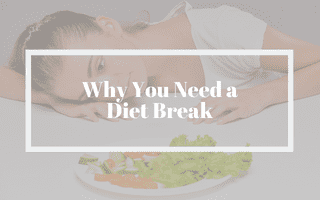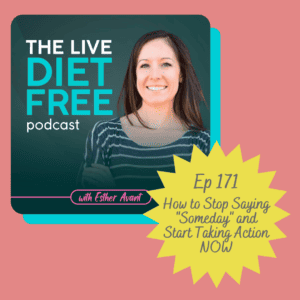Does the idea of taking a diet break before you’ve reached your goals scare you?
Don’t let it.
Especially if you have a significant amount of weight to lose.
Lifestyle changes are the true key to long-term success and no one should be chronically dieting (I did name my Facebook group Live Diet-Free, after all).
But, research shows that dieters are much more successful at losing – and keeping off – weight when they take “diet breaks” during the process.
If you prefer to listen for more info about diet breaks, click below to hear The Live Diet-Free Podcast: Episode 59. Diet Breaks and Reverse Dieting.
What is a Diet Break
A diet break is exactly what it sounds like: a period of time during which you are not actively trying to lose weight.
A break can last anywhere from one week to several months, depending on your individual circumstances.
I do want to be clear that taking a break does not mean reverting back to your old habits.
Instead, you should eat to maintain your weight while allowing yourself some moderate indulgences. This time off gives your mind and body time to adjust before recommitting to another stretch of time in a calorie deficit.
When to Take a Break
If you’ve been dieting for more than a few months straight, you should consider pressing pause for a couple of weeks and taking a diet break.
Those of you who can’t remember the last time you weren’t on a diet, you should definitely take a break – probably for a good deal longer.
If you’re doing all the right things but aren’t seeing results or if you’ve already cut calories very low, it’s probably time for a break.
Vacation coming up and you don’t want to spend the whole time stressing about following the “rules” of your diet? Schedule a diet break.
Just feeling generally unmotivated, stressed out, lethargic, or not totally on-board with dieting right now? Stop for a while.
Remember, this is a temporary hiatus, not you giving up on your weight loss goals.
Physical Benefits
As you lose weight, your metabolic rate adjusts down. This is largely because now there’s less of you to sustain but there’s also a hormonal component at play.
Taking a diet break and moving to maintenance (aka eating to stay the same weight) for a couple weeks gives your hormones time to recovery from the time spent in a calorie deficit.
Some people experience a decrease in performance or muscle mass during a diet which can be remedied by a couple of weeks with additional calories.
Diet breaks can potentially help your body stabilize at your new, lower, bodyweight and give your body a better chance of accepting that weight as the new normal.
Psychological Benefits
At least as important as the physical benefits of taking a diet break are the mental benefits.
Many people approach dieting like they’re going to be sacrificing forever – just eating less and moving more until someday in the future, hopefully, they reach their “goal” weight and all their dreams come true.
Depending on how much weight a person has to lose, this can feel really daunting and overwhelming. A diet break provides some light at the end of the tunnel. It becomes easier to put your head down and do the work when you know you’ll get a reprieve soon.
Diet breaks allow you to be in control because you can choose when to schedule them, rather than unexpectedly losing control (aka binging) and being forced into a break.
Imagine not stressing about how to diet on vacation because you’ve intentionally planned a short break for that time?
Additionally, knowing that these breaks are part of the long-term plan makes it easier to get back on track afterward.
This means that committing to another fat loss phase post-vacation might not feel like such a struggle.
Perhaps most importantly, diet breaks increase your long-term adherence, which is the most important thing in terms of seeing fat loss.
They’ll help you lose fat more effectively, but also increase your odds of long-term success because you won’t be constantly stressed about endless dieting.
How to Do It
You’ll want to ease yourself out of your calorie deficit by increasing your intake until your weight stabilizes (you can do this as gradually as you’d like.)
This may be less food than you were eating prior to the diet or challenge because now there’s less of you to sustain but the goal is to maintain your current weight for a few weeks or months.
Mentally wrapping your head around the importance of taking a diet break is often the hardest part. It can be a struggle to realize that you’ll be eating more – and not actively trying to lose more – when you’re not yet where you want to be.
Remind yourself that the breaks are just as important as the actual dieting for your physical and mental health, as well as your long-term success.
Need help? You don’t have to do this alone! We have a team of coaches and an incredible community of women all ready to help you succeed. Check out our Gone for Good program and let me know how we can help you reach your goals.




